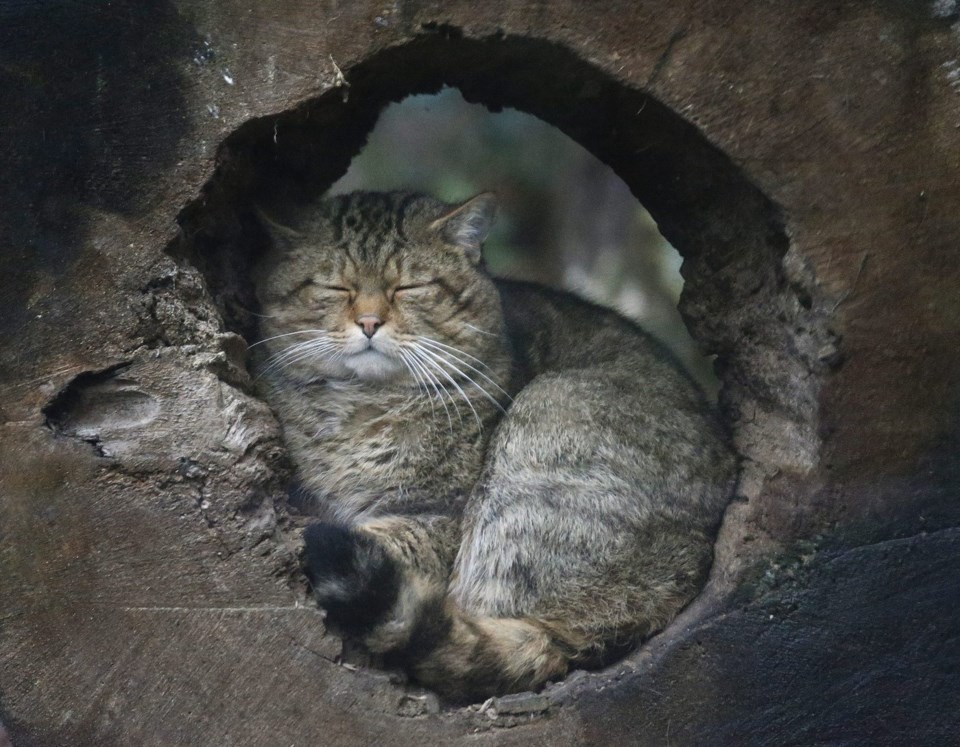VICTORIA — When Bill Edwards feeds his pet servals Luna and Tumas on his rural Vancouver Island property, he cannot just simply reach for cans of cat food.
He instead serves them raw chicken and frozen quail.
"They are basically a wild animal," he said of the wildcats that are native to African savannahs and wetlands, and can grow to 40 pounds.
"They are not like a house cat by any means."
That is also why servals are being added to British Columbia's list of "controlled alien species" under the provincial Wildlife Act, banning the breeding, sale and future ownership of all exotic and non-domestic cats.
Some 1,200 animals are already on that list, and if the legislation goes through, servals, ocelots and European wildcats won't be allowed as pets in the future.
Provincial law already prohibits ownership of large cats such lions, tigers, jaguars, leopards and cheetahs.
The proposed legislation announced on Tuesday would allow current owners like Edwards — who sometimes refers to himself as Bill Exotic — and girlfriend Laurel Bablitz to keep Luna and Tumas, provided they apply for free permits.
Edwards, who lives near Qualicum Beach north of Nanaimo, says he sees the rationale behind the proposed changes — but only to a degree. Anybody living in a city should not be allowed to own such animals, he said.
"I don't believe that is a good idea," he said. "I believe they could be owned in an area where I live, in an out-of-town kind of environment."
The SPCA does not agree.
Both Luna and Tumas escaped in October 2022. Edwards said he believes somebody deliberately opened their outdoor cage.
They were recaptured and returned home, but not before Luna killed several ducks belonging to a neighbour and Tumas killed a domestic cat.
Their case was cited in a January 2023 letter from Sara Dubois, chief scientific officer for the B.C. SPCA, to the Regional District of Nanaimo.
"The recent escape of two servals in the Regional District of Nanaimo was shocking for the community, but sadly it was not surprising to us," Dubois wrote, pushing for limits on ownership.
"Despite being born in captivity, these exotic cats are not domestic animals, as domestication takes thousands of years of breeding to achieve."
She wrote that serval kittens could be sold for $10,000 or more, and that in 2019 a cruelty investigation near Kamloops resulted in the seizure of 13 distressed servals.
The B.C. government said in a statement that the changes respond to "long-standing concerns" from animal-welfare organizations and wildlife experts about public safety and environmental risks that such animals pose.
While details of the proposed legislation are still emerging, the proposed ban fulfils a long-standing demand from the B.C. SPCA.
Dubois said in her 2023 letter that her organization had asked the provincial government "many times over the past decade" to include servals and other exotic species on the controlled alien species list.
While Dubois praised efforts by municipal politicians to develop local bylaws against the keeping of exotic animals, she said they were insufficient, because they did not cover the whole province.
She said 8,000 people signalled support for a ban after the Kamloops case.
"The vast majority of the public supports exotic animal bans, knowing it is cruel and dangerous to keep wild animals (whether they originate in Canada or other countries) as pets," she said.
The government said the changes would also benefit the animals themselves by creating standards for their keeping.
Luna and Tumas are both eight years old, making them relatively young, since servals can live up to 25 years in captivity.
Edwards, who purchased Luna and Tumas when they were adults, said keeping the exotic cats could be costly, given the food bill and veterinarian costs. When Tumas broke a leg, it cost $6,500 to treat.
But Edwards said he had always wanted a serval and Luna and Tumas are part of the family.
"I love them," he said.
This report by The Canadian Press was first published July 8, 2025.
Wolfgang Depner, The Canadian Press




